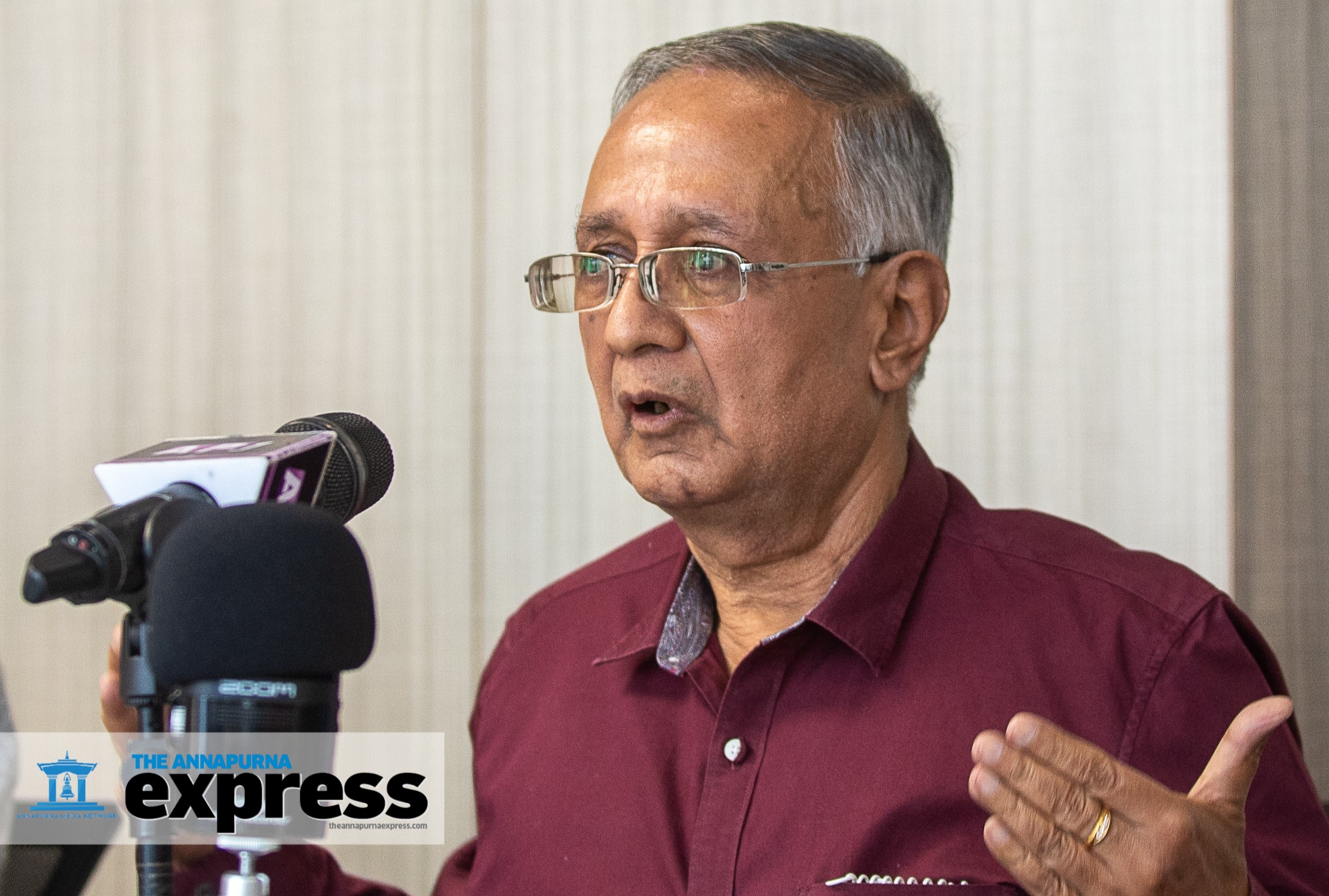Nepal-China relations have been rather choppy of late, particularly after the Nepali parliament’s ratification of the MCC compact. China believes the current (election-bound) Sher Bahadur Deuba government does not prioritize ties with the northern neighbor. Members of the government, meanwhile, seem wary of recent Chinese assertiveness in Kathmandu.
When Chinese Foreign Minister Wang Yi visited Nepal in the third week of March, Beijing and Kathmandu were expected to mend fences and sign something concrete under the BRI. It was not meant to be.
This week ApEx held a roundtable with some China experts on the current state of Nepal-China relations. Excerpts:
(Note: Indira Adhikari and Sharada Ghimire, the two other invitees to the roundtable, had to pull out last-minute due to personal emergencies.)
China has become a bargaining tool for power
Pramod Jaiswal
(Research Director at Nepal Institute for International Cooperation and Engagement, with specialization in China and South Asia)

To understand China’s Nepal policy, it is imperative to delve into its larger South Asia policy. Beijing has prioritized South Asia with the view to developing its southern and western regions, particularly Tibet, which is comparatively less developed than other parts of China.
Xi Jinping is the first Chinese president to visit all South Asian countries, except Bhutan with which China does not have diplomatic relations. With Nepal, China is developing relations in trade, defense, and security. It is also engaging with Nepal at the political level.
Scores of countries seem eager to enhance ties with China for their economic development, but we have been unable to do so. Even the countries that have hostile relations with Beijing are benefiting from China’s growth. But even as a neighbor, we haven’t been able to strengthen ties with China.
Whenever our politicians feel that their positions are under threat, they try to use China as a tool to stay in power. This happened during the Panchayat regime, and this is happening today. Even when the communist government led by KP Sharma Oli was in power, there wasn’t much progress in Nepal-China relations.
China will not engage with Nepal to the extent of offending India. What China rather wants in Nepal is a trustworthy and long-term partner to address its security and economic concerns. Before 2008, China was completely reliant on Nepali monarchy to pursue its interests here. Now, China is engaging with all political parties.
There has been much rhetoric about MCC and BRI, but what is our official stand on these issues? We never delve into the economic aspects of these issues, only seeing them through the narrow lens of nationalism. We lack the vision and willpower to benefit from China’s rise. It’s high time that our political leadership mended its ways.
Deuba has chosen one neighbor over another
Gopal Khanal
(Foreign affairs advisor to KP Oli during his first term as prime minister)

We have to understand that China is an emerging superpower. The world is becoming multipolar, and China’s foreign policy has vastly changed from the one adopted by Deng Xiaoping. Beijing is now more assertive in the international arena than ever before.
China shares borders with 14 countries. But it wants to engage not just with its neighbors, but also with the world at large. Thus its greater presence in Nepal is to be expected. But it is crucial that Nepal adopts a balanced foreign policy with India and China. Both the neighbors are equally important to us.
But it seems the current five-party ruling alliance undervalues China. There is a perception that this government favors Western countries. China should be Nepal’s highest foreign policy priority. There have been some departures in our bilateral engagement with China under PM Deuba. First, you see a clear anti-China prejudice. For instance, soon after its formation, the incumbent government formed a panel to look after alleged Chinese encroachments of Nepali territories, even though the two previous governments had already concluded that there was no border dispute. Second, when Chinese Foreign Minister Wang Yi visited Nepal, there were no talks on BRI projects.
I see the current government choosing one neighbor over another. Due to serious lapses in judgment of our political leadership, we find ourselves in a difficult geopolitical spot. When Chinese President Xi Jinping visited Nepal in October 2019, he talked about turning Nepal from a landlocked country to a ‘land-linked’ country. This was a momentous announcement but there was then no follow-up from our side. We have never seen our relations with China through the lens of larger national interest.
There have been some mistakes from the Chinese side as well. For instance, Chinese Ambassador to Nepal Hou Yanqi’s running-around to save the Nepal Communist Party from imploding did not send a good message. Likewise, China could have resolved the problems at border points to smoothen the supply of goods. On the MCC compact, too, it would have been better had Beijing refrained from making any statement.
Indo-Pacific’s prominence has affected Nepal-China ties
Rupak Sapkota
(Former Deputy Executive Director at the Institute of Foreign Affairs under foreign ministry)

There are three ways of viewing Nepal-China relations. First is the larger geopolitical context. There has been extreme pressure on international power-balance of late due to growing rivalry among big powers. Strategic convergence between India and the US is increasing, and China and the US are headed towards confrontation. So the geopolitical center of gravity is gradually shifting to the Indo-Pacific. Such developments are likely to have some implications on Nepal’s national security and sovereignty as well—and which is also why we are seeing some stress in our relations with China.
Our economic ties with China are stagnant. This did not happen even when there was a supposedly China-friendly government of left parties at the helm. We signed the transit and transport agreement with China, but it didn’t move ahead. Similarly, we signed several vital agreements when Xi Jinping was in Nepal, and they too remain unimplemented.
I think there is a structural problem. Trade and connectivity with China should run parallel to our relations with other countries. We often make the mistake of seeing China as an alternative when our relationship with the other neighbor sours. Carefully balancing our neighbors should be the utmost priority of any government.
China now sees Nepal not only from the security viewpoint but also as a strong economic partner. In recent years, Chinese investments in Nepal have increased but are still to benefit from the latest Chinese technology and knowhow. At the same time, there is growing interest among the Chinese about Nepal, which can be seen in Chinese social media platforms.
In order to close the loopholes in the conduct of our foreign policy, including with China, we must have a sound mechanism to provide timely inputs to the government. But what we see is our policy-related institutions are not functioning well due to lack of resources, politicization and other issues.
No institutional framework to settle Nepal-China issues
Upendra Gautam
(General Secretary at China Study Center-Nepal)

Frankly speaking, geopolitically, we are not in a comfort zone. Nepal should have a long-term view on our relations with China, which is lacking. We have policy inconsistency with China. We should stop viewing our ties with any country from the perspective of one party or government. Whenever there is a government change in Kathmandu, a new foreign policy is drafted. But why? The basic framework of foreign policy should remain unchanged.
The problem is not just with the present government. For instance, time and again Nepal has failed to take up its issues with China in a frank and assertive manner. Our individual leaders take up important issues with China without understanding that China will not heed them until such proposals come via official channels.
We should keep our relationship with China within a certain institutional framework. Without that, Nepal has been unable to raise its issues with China in a systematic way. We have signed many agreements with China, but have they been incorporated into our national plans and policies? Obviously not.
We are witnessing a sort of anarchism in our bilateral relationship with China due to a culture of indiscipline. When we talk to China, we should tell them exactly what about their policies hurt us so that they can go about addressing them. But seldom do we do enough homework to identify our issues or to present them clearly before the Chinese.
Nepal should pursue an independent foreign policy. Geopolitical pressures and concerns are always there, but we can handle those issues with right vision and leadership.
We should also deal with China without third-party influence. For instance, on the MCC compact, the Nepali prime minister could have held a phone conversation with the Chinese to assure them that its parliamentary endorsement would not affect Nepal-China relations.
One thing I want to add concerns Nepal-China railway. Nepalis seem to believe that the railway can be built overnight. But we have no good plans for it. You cannot expect China to build such an expensive project and drop it in our laps. Nor have we been able to convince the Chinese that we have either the resources or the manpower to operate such a tricky rail line.











